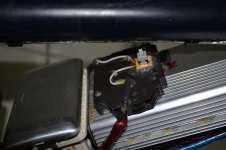El_Steak
10 kW
This is a continuation of the fuse discussion started in the Zippy Flightmax / Turnigy lipo testing thread. It was off-topic in that thread so I moved it here.
I want to add shorts protection to a 24s Lipo setup - 100V / 75A (Cycle Analyst-limited) and I'm not sure which way to go.
The "standard" fuses available at the hardware store seem to max out around 40 amps.
Then there are "MAXI" fuses that seen to max out around 80 amps.

Higher than that, I saw a lot of "Fusible Links". They seem to go up to 140 amps. Not sure if those are the same as fuses though.

I also saw some DC-breakers up to 150amps. Not sure if they'll like 100V though:

So what are you guys using to protect high-amps setups?
I want to add shorts protection to a 24s Lipo setup - 100V / 75A (Cycle Analyst-limited) and I'm not sure which way to go.
The "standard" fuses available at the hardware store seem to max out around 40 amps.
Then there are "MAXI" fuses that seen to max out around 80 amps.

Higher than that, I saw a lot of "Fusible Links". They seem to go up to 140 amps. Not sure if those are the same as fuses though.
I also saw some DC-breakers up to 150amps. Not sure if they'll like 100V though:
So what are you guys using to protect high-amps setups?










